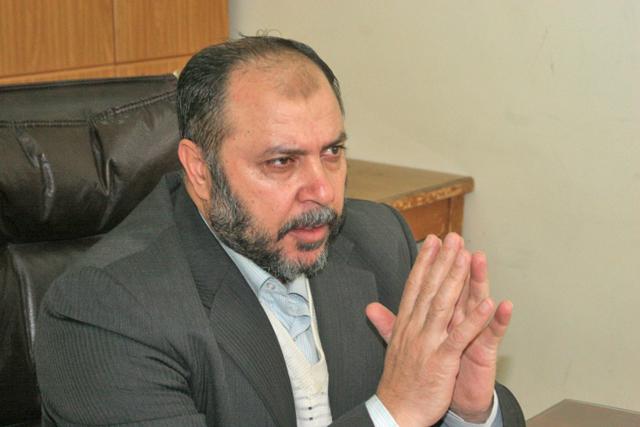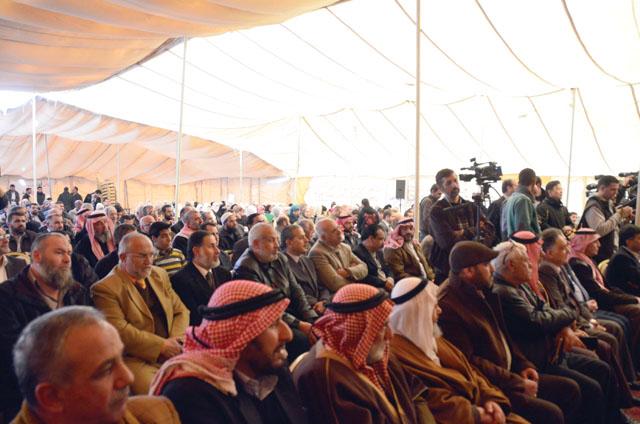You are here
Former politicians gather to ponder Jordan’s reform efforts, future policy
By Rana Husseini - May 01,2019 - Last updated at May 01,2019
AMMAN — Former politicians on Tuesday agreed that the country should unite against any repercussion that might result from the so-called “deal of the century”.
“There is a grave threat to Jordan if the deal of the century is implemented and the Kingdom might be put under pressure to accept a new reality,” former prime minister Taher Masri said.
The former premier added that His Majesty King Abdullah “should not carry this burden alone”.
“Everyone, including the government, civil societies and organisations and political parties, should unite together,” Masri said.
The former premier made the remarks at a session tackling Jordan’s political reform map during a conference entitled, “Jordan’s Transition — 30 Years after the Martial Law”, which was organised by the Konrad Adenauer Stiftung (KAS) with the Al Quds Centre for Political Studies (QCPS).
Jordan has repeatedly stressed its rejection of any deal that seeks to alter the status quo in Jerusalem or seeks to terminate the Palestinian refugees’ right to return to their occupied homeland and be granted compensation in accordance with UN Resolution 194, which called upon Israel to allow Palestinian refugees who were “prepared to live at peace with their neighbours” return to their homes.
Under the resolution, Israel was obliged to compensate returning Palestinians for damage to their property and for the property of those who chose not to return.
No information has been announced on the deal, but according to several media reports it is expected to be announced after the holy month of Ramadan, which is due to start in the first week of May.
His Majesty King Abdullah has repeatedly stressed that “the future of Jerusalem and Palestine is a red line for Jordan”.
King Abdullah has said that the position of Jordan and all Jordanians was unwavering on Jerusalem and on any attempts to create an alternative homeland for the Palestinians in Jordan.
His Majesty also criticised those questioning Jordan’s “unequivocal position”, underscoring that “this is the position of the Hashemite Kingdom of Jordan and all Jordanians”.
“To anyone who speaks about an alternative homeland, the answer is no.”
Addressing Jordan’s political reforms, former secretary general of the Islamic Action Front Zaki Bani Rsheid said the opposition has never called for “changing the regime but rather to adopt serious reform measures”.
“The focus should always be on changing the manner in which things are running in the country and not the regime as was the case in neighbouring countries,” Bani Rsheid told the gathering.
That is why, Bani Rsheid added, “the focus should be on initiating daring and comprehensive reforms if we want to have a better democratic process”.
The Islamist leader stressed the need to have an open and transparent dialogue “if we want to have serious reforms”.
“The Jordanian people are moderate and they will accept the minimum steps of reform and everyone [would] accept a constitutional system with the King as the head of the regime,” Bani Rsheid stressed.
Former information minister and government spokesperson Mohammad Momani said that “steps for political reform should be gradual in order for it to succeed and be effective”.
The former minister also pointed out that many people criticise the existing election laws, pointing out that “even if we change the election laws you will have people who will object to it”.
“I believe what is really important is for the people who will elect their deputies to choose wisely rather than constantly criticising the election law,” Momani added.
Director of the QCPS Oraib Rantawi said the aim of the two-day event was to contribute in clarifying Jordan’s political reform map and attempt to build a national consensus around it.
Meanwhile, KAS Resident Representative to Jordan Annette Ranko said the event focused on dealing with the reform efforts which Jordan originally embarked upon 30 years ago.
“There is a lot of interest in Europe to see how the political reform is evolving [in Jordan] and what steps are needed to keep it on the safe track,” Ranko told The Jordan Times.
“We want to encourage dialogue between the parties and the government here in Jordan because we believe in pluralism, and we would like to strengthen the plurality in the parties and also focus on youth,” Ranko stressed.
Related Articles
Jordan’s Muslim Brotherhood spoke out against authorities’ arrest of the movement’s deputy overall leader Zaki Bani Rsheid, calling his jailing a “political stunt”, while officials insisted that the hawkish politician broke the law.
Jordanians and Palestinians from different walks of life took part in a forum on Saturday to voice their rejection of US Secretary of State John Kerry’s proposed “framework” for a final peace deal between Palestine and Israel.
The State Security Court (SSC) on Sunday threw out an appeal challenging the constitutionality of the trial of Muslim Brotherhood deputy overall leader Zaki Bani Rsheid for harming Jordan’s ties with the United Arab Emirates.
















